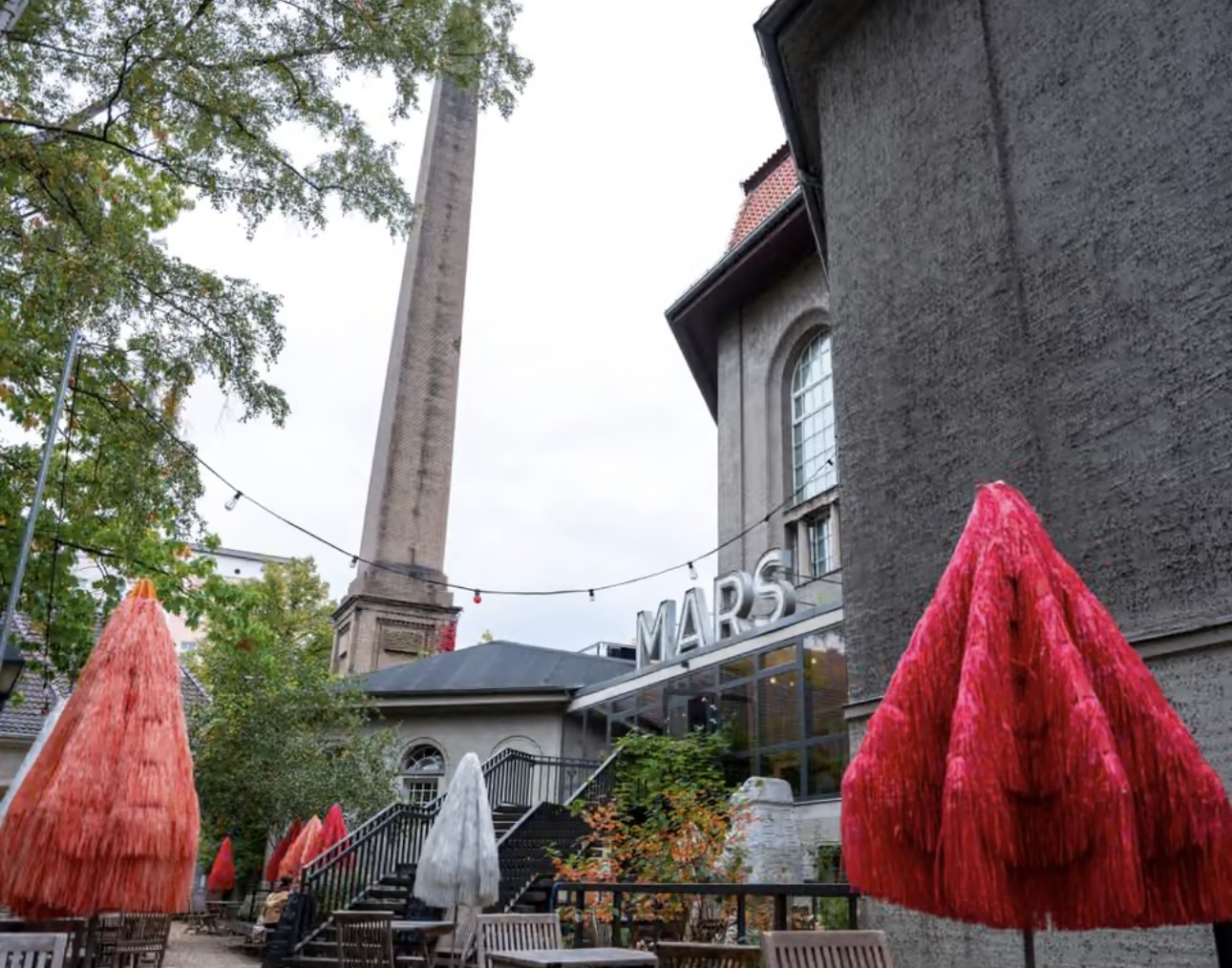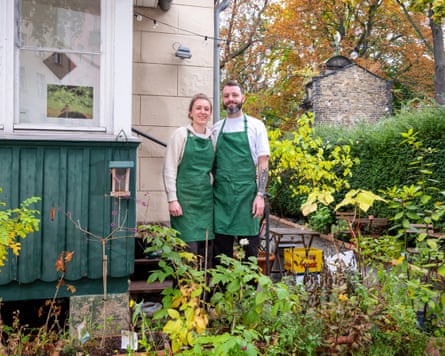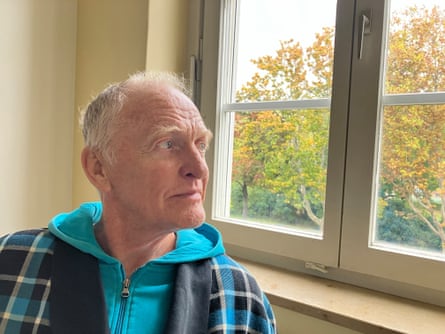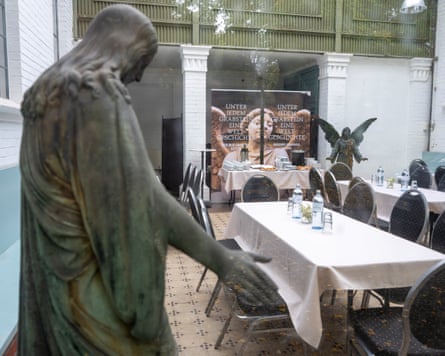It’s more about life than death’: the growing popularity of Berlin’s cemetery cafes

They’re beautifully tucked away in some of the quietest, leafiest corners of central Berlin, and for their passionate patrons, they are a way of life among the dead.
The German capital has about a dozen cemetery cafes – not necessarily spaces for mourning, although they can be that, too – but mainly serving as islands of peace in busy districts.
Unlike Paris or New York, where burial grounds traditionally occupy vast expanses on the historical outer reaches of the urban landscape, Berlin’s cemeteries have long been human-scale and primarily kiezbezogen, or rooted in communities.
There has been a boom over the past decade, with coffee houses opening within cemetery walls and even in a former crematorium. Initial fears that customers would be spooked or mourners offended have proved largely groundless.
One cafe, Lisbeth, is ensconced in a former parish hall surrounded by mature Japanese cherry trees. It is managed by Italian-born Chiara de Martin Topranin, 30, who found it via a vaguely written online advert seeking “someone to run a lovely spot in the Mitte district with a great garden”.

Over a cappuccino with a view of the Protestant Sophien cemetery’s undulating field of headstones, she says she balked at first when the building’s owners revealed she would be working in a graveyard.
“It was unthinkable for me as an Italian,” says Topranin. “For us death is something to be hidden. When I told my family, they said, ‘Chiara, have you lost your mind?’ But the more I thought about it, the more I thought: you have to do this.”
Since taking on the role, Topranin, who studied psychology, soon noticed that her clientele came to her “with a different energy than in a normal street cafe”. “As soon as they pass the cemetery gates, they just seem a bit more empathetic, a little gentler.”
She tries to strike a delicate balance with her guests, respecting the anguished in the throes of grief while not putting off those looking for a pleasant, if unusual, place to enjoy their lunch break.
“I never accept weddings,” she says. “I will do a birthday party but it has to be reasonable – never a big bash. I’ve had guests who took their Aperol spritz out among the gravestones. Then I’m quite strict and say, there’s a limit.”
Although Berlin’s Friedhofscafés have steadily grown in popularity, few regulars are aware of their roots in the Aids crisis and changing practices around death and burial.
Bernd Boßmann is widely acknowledged as the father of the cemetery cafe movement, having opened Germany’s first in 2006. Finovo is located in Berlin’s Schöneberg district, a focal point of LGBTQ+ life for more than a century.

A veteran of the 1980s fight for HIV research, Boßmann had his own coming out during what he says was often dismissed as the “gay plague”. He saw countless young friends cut down in their prime, many of them buried in the fabled Old St Matthäus cemetery, where the folk and fairytale publishers Brothers Grimm were laid to rest a century before.
“But I realised that while it was a fine place for the dead, it was awful for the living,” says Boßmann, 65. “There was nowhere pleasant to sit down, nowhere to buy flowers, not even a place to go to the bathroom. That’s when I noticed the small abandoned building near the gates.” From that building, Finovo was born.
Nearly 20 years on, Boßmann has handed off management of the cafe with its Red Poppy florist shop, and it has spawned similar spots across the city, each with its own ethos.
As new generations of Germans opt increasingly for cremation over burials, cemeteries have encountered financial problems in maintaining their lush grounds with dwindling demand. Desolation made many a target for vandalism and crime.
Meanwhile, the cost of commercial real estate has soared, making the repurposing of disused cemetery buildings an appealing prospect.
Many patrons say they find the proximity to death a surprisingly comforting experience.
“I came around the corner and saw a group of mourners holding a eulogy,” says André, a 37-year-old social worker, over a late breakfast at Cafe Friedberg, in a wooded cemetery complex in the Kreuzberg district.

“I quietly went round and got to the cafe entrance.”. A group outside the window dressed in black gave their final goodbye with a Neil Young song playing on the speakers. He says: “I personally would find it cool if my own funeral could be like that, with everyday life still taking place all around me.”
A bit farther south, 21 Gramm in Neukölln – a vast multicultural district that has been an epicentre of Berlin’s gentrification – sees itself as a “little oasis” off the teeming Hermannstraße.
It takes its name from the mythical weight of a human soul. The romanesque revival chapel of rest was a derelict storage space before its new beginning eight years ago as a local hotspot.
“It’s so lush and so green amid all the linden trees and is always really lively. So it’s a lot more about life than death,” says yoga teacher Ieva Grigalavičiūtė, who lives in a flat overlooking the cemetery, of the cafe.
“I’m from Lithuania and we have a saying that every time someone in the family dies, someone is being born. So it’s the same thing here, right? Death and rebirth.”

The Mars coffee house in the Silent Green cultural complex in the northern borough of Wedding is located in a decommissioned crematorium and looks out on the Gerichtstraße burial ground, conjuring similar thoughts about vibrant social life and mortality.
Sipping flat whites in the shadow of the towering brick chimney, Ukrainians Yulian Herasymenko and Ruslana Shabelnyk chose to visit Mars “because it has this spooky Twin Peaks vibe”, referencing the surreal horror US television series from the 1990s.
But the budding designers in their early 20s, who have lived in Berlin since Russia’s full-scale invasion of their country, says they are drawn to the space for more than the frisson and the coffee.
“It’s also just really beautiful,” Shabelnyk says. “It has good service and you can hide from the outside world – the perfect combination.”

